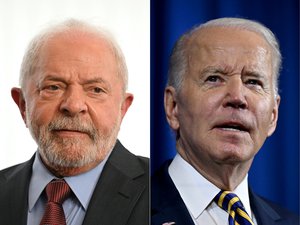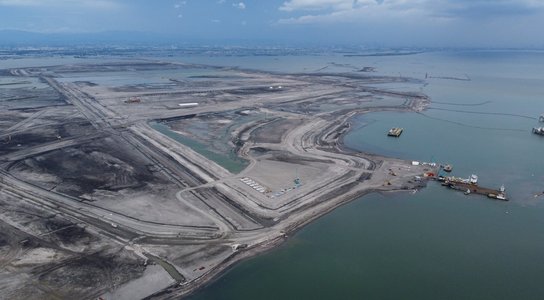Today, Brazilian President Lula will meet with President Biden in DC. While the meeting is expected to cover a range of issues – for example, what to do about Bolsonaro – perhaps the most important topics will be how the two countries can work together to protect the Amazon rainforest in a way that centers the needs of Indigenous and local communities, including pathways for accountability and remedy for existing and past harms.

Brazilian President Luiz Inacio Lula da Silva (left) and US President Joe Biden (right). EVARISTO SA,JIM WATSON/AFP via Getty Images
Each president will have positive updates to share.
President Biden committed the U.S. to the Glasgow Leader’s Declaration on Forests and Land Use, and pledged $9 billion and signed an executive order to help meet the goal to end natural forest loss and begin restoration by 2030. And last month, the U.S., as Chair of the of the Summit of the Americas process, reiterated its commitment to protect land and environmental defenders in Latin America and beyond.
As for President Lula, his pledges to protect the Amazon will surely draw on actions from his previous tenure as President. He also committed to increasing protection for the rights of Indigenous communities who face serious human rights abuses often linked with deforestation and other land and environmental abuses. However, he’ll have to undo the accelerated deforestation that took place under the previous Bolsonaro presidency and contend with a tricky global economy that may limit some of his spending options.
It’s a challenge the two Presidents should
embrace. Research from this year shows that 17% of the Amazon
has already been deforested, and of that remaining forest, 38%
is degraded. The consequences of
destruction at this scale and pace could become even more devastating. If enough
of the Amazon is lost, the climate-critical forest may be unable to sustain its
own hydrological cycles. This could trigger a tipping point that
transforms large parts of the ecosystem into a savannah.
Further, land and environmental defenders who are the best protectors of the Amazon are themselves under attack with Brazil emerging as one of the deadliest countries in the world for defenders, with a third of those killed being Indigenous or Afro-descendants and over 85% of killings of defenders taking place within the Brazilian Amazon.
With Lula’s visit to Washington this week, President Biden and Congress have an opportunity for a new approach that recognizes and addresses the U.S.’s outsize role in driving deforestation outside its borders. Here’s three ways President Biden and President Lula could work together to make real progress on the fight against deforestation.
1) Center the need to address human rights abuses in supply chains – including finding pathways for redress and remedy
In Brazil, the land under Indigenous community control is proven again and again and again to be the best protected. And yet the ongoing spread of industry puts these lands at risk of encroachment or land grabbing, and the communities must contend with the risk of violence and death. Globally, on average a land and environmental defender has been killed every two days for the past decade.
The Lula administration is moving ahead with building protections for Indigenous people. The newly created Ministry of Indigenous Peoples – with Indigenous activist and politician Sonia Guajajara as Minister – is a positive move. The Biden administration has reiterated its support for finding pathways to improve justice for land and environmental defenders. But more needs to be done to address the role of U.S. companies for environmental crimes and human rights violations throughout their global operations.
In any partnership moving forward, the two countries must explore solutions for using a rights-based approach that centers Indigenous sovereignty and allocates resources and support to this end. For the U.S., this should include accountability pathways within our supply chains for impacted populations to fairly seek redress and remedy.
2) Move towards mandatory approaches to curb deforestation
Right now, the primary approach that companies use for dealing with deforestation in their supply chains is to commit voluntarily to ending it in their operations.
At the most recent COP, fourteen of the world’s largest agribusiness traders – including some of the largest exporters of commodities driving deforestation – released an underwhelming strategy to align with the 1.5C climate goal that failed to mention Indigenous peoples at all. This isn’t the first time that big players in the food industry have set seemingly ambitious targets for forests – and yet in those instances, they’ve failed. This new commitment has little promise.
Individual corporate commitments don’t fare much better. Global Witness often exposes companies who fail to meet their own commitments. For example, in 2022 Global Witness released an investigation showing that Brazilian beef company JBS, which also operates in the U.S. and is the biggest meat packing company in the world, continued to source from farms where they had previously found land grabbing, slave labor, and deforestation. This went against the company’s own commitments to end deforestation and against legal agreements with Brazilian prosecutors.
Policies are only words on a page if they are not put into action.
One important action the U.S. could take would be to pass the FOREST Act. This law would end the importation of products causing illegal deforestation and it would also build a structure for the U.S. to provide more targeted assistance and partnership to countries that currently have high deforestation rates. Importantly, it would provide a regulatory framework to align our markets with private sector commitments and with our national climate commitments to the world.
The FOREST Act would also put us in step with regulations happening in other major consuming markets. As of late last year, the EU Commission is set to pass a new law to regulate deforestation products in supply chains.
3) Stop the flow of U.S.-based financing that drives deforestation abroad
Some of the major U.S. financial institutions are profiting tremendously from deforestation. A 2021 Global Witness report looked into the financials of twenty businesses linked to deforestation and found that U.S. financial institutions profited an estimated $538 million from deals worth billions in deforestation-risk commodities such as soy, beef, palm oil and pulp and paper supply chains between 2015-2020.
Financial institutions have their version of voluntary commitments as well. The Glasgow Financial Alliance for Net Zero (GFANZ) was announced in 2021 as a vehicle for the global financial industry to move towards assessing climate risk – including deforestation risk – in their operations. And yet a year later, Global Witness found 360 asset managers retained forest-risk investments worth an estimated $8.5 billion, marking only a 3% decrease since their net zero commitment made in September 2021. Not only this, but several U.S.-based financial institutions Blackrock, State Street, and Vanguard - (who has since exited GFANZ) were found to increase their exposure to companies with high deforestation-risk.[1]
We will never truly delink global trade from deforestation while financial institutions continue to provide financing, investments, and financial services that allow forest destruction to continue. President Biden needs to confront this flow of finance from U.S.-based institutions.
Absent legislation that would encourage this, such as an amended FOREST Act, it becomes even more crucial that the ongoing climate-risk disclosure rule being developed by the Securities and Exchange Commission remains strong and includes scope 3 emissions – and that this process isn’t derailed by the growing anti-ESG backlash. Failing to do so wouldn’t only put forests in U.S. global supply chains at greater risk, but it would also further expose and make U.S.-based investors complicit in the illegality, corruption, and human rights abuses that are so often found with high rates of deforestation.
When President Biden meets President Lula this week, the best thing he can offer is a commitment to working with Congress to delink global trade from tropical forest destruction – by focusing on these three things: human rights, supply chain legislation, and financial flows. Such an agreement would be ‘win, win’ both in leadership terms as the world grapples with how to tackle global warming which is already having alarming impacts; and in economic terms as Lula works to protect the regional climate and ecosystems on which his national agriculture systems rely, and as Biden seeks to stay on the front foot in the global green economy. The world will be watching.
[1] The institutions’ responses to our findings are included in our report


